As a vegan, I often tend to float back to the broad spectrum of Indian cuisine, which is where my Kerala potato curry draws inspiration from. India is a country with over one billion citizens (and growing fast), with a staggering 500 million of which that are vegetarian. The treatment of vegetables and the use of spices in the cuisines of the subcontinent, particularly that of Kerala which often replaces dairy with coconut milk, is a great source of inspiration.
In the title, I suggest three reasons to try your own Kerala potato curry. Whilst I’d say there are many more, I present my favourite reasons for keeping this vegan potato curry recipe close by.
This spinach potato curry is a great introduction to basic vegan Indian inspired home-cooking – it is not too fiery (although you can turn up the heat by adding additional chillies), it is colourful with bright yellow turmeric and luminescent green from the spinach and coriander, and it is easy to prepare. If you love this dish, which you no doubt will, the spices used form the base of many other Indian favourites. Hope you enjoy it!
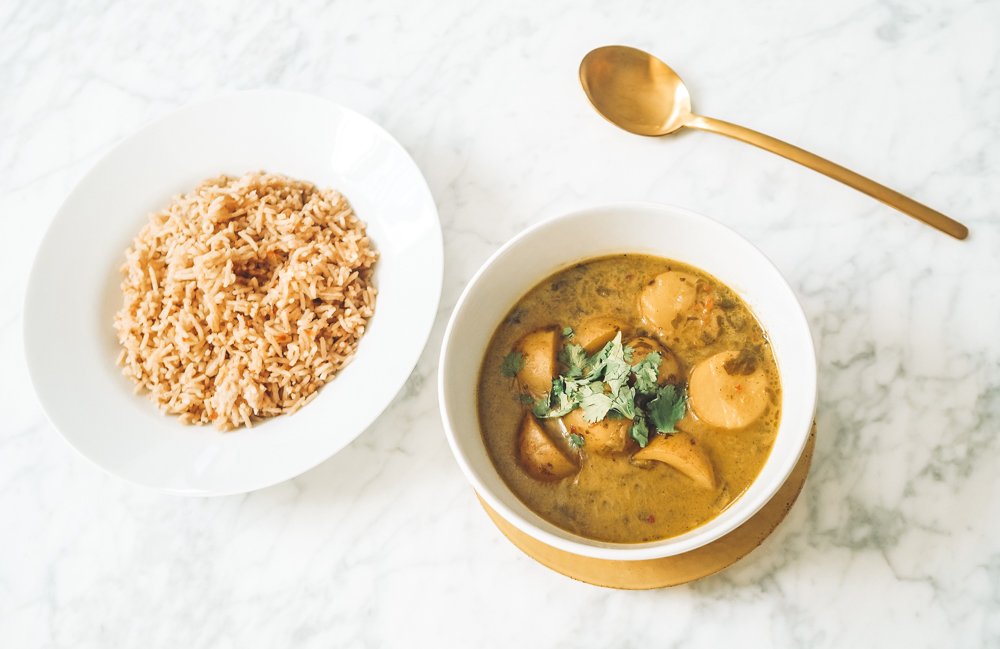
Recipe Cards
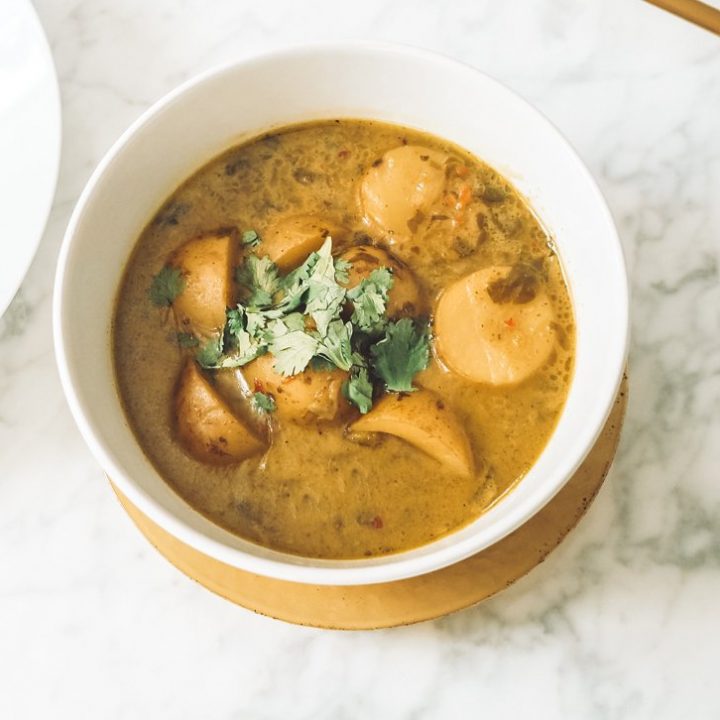
Kerala Potato Curry
A mild, warming and fragrant spinach potato curry with a creamy turmeric-infused coconut sauce.
Ingredients
- 500 grams of small waxy potatoes
- 1 finely chopped large white onion
- 1 tablespoon minced ginger
- 1 tablespoon minced garlic
- 1 tablespoon minced fresh turmeric root OR 1 tablespoon turmeric powder
- 2 tablespoons cumin (jeera) seeds
- 1 teaspoon coriander seeds
- 1 teaspoon mustard seeds
- 1 teaspoon caraway seeds
- 8 whole cloves
- 1 teaspoon chilli flakes
- 1 tablespoon garam masala powder
- 3 tablespoons coconut oil
- Salt to taste
- 2 cups of chopped spinach (fresh or frozen, both work)
- 2 tablespoons of kerisik OR 2 tablespoons of coconut cream (optional)
- 2 cups of vegetable stock
- 2 cups of regular or thick coconut milk
- 1 handful of chopped fresh coriander
Instructions
- Toast the caraway seeds, mustard seeds and coriander seeds together in a pan until fragrant. Remove the seeds and grind using a pestle and mortar. Do the same with the cumin seeds and reserve half of the ground toasted cumin seeds NB: you can use pre-ground spices like coriander powder, but freshly toasted spices elevate the dish.
- Heat up a tablespoon of coconut oil in a pan. Add the finely chopped onion to the pan and season lightly with salt. Add half of the ground toasted cumin and the cloves, and sautee lightly over medium heat until the onions have been lightly caramelised. Remove the cloves (remember to count them, you don't want to break a tooth on one!), and set the onions aside.
- Heat up two tablespoon of coconut oil in a pot. Add in the ground toasted spice seeds, the remaining ground toasted cumin, the chilli flakes, turmeric, ginger and garlic and cook at a low to medium temperature to develop the flavour of the spices and the aromatics. When the paste is cooked down, add in the washed and quartered potatoes to the pot and toss to coat with the spice and aromatic paste.
- Add the coconut milk and vegetable stock to the pot, bring to a boil and turn down to a simmer. Add in the chopped spinach and the kerisik, cover the pot and allow to simmer and the liquid to thicken and reduce by one third to half (this should take about thirty minutes). If you decide not to use the kerisik, just reduce the liquid further as it will not be as thick.
- Uncover the pot and mix in the sauteed onions, a tablespoon of garam masala powder and salt to taste, and allow to cook for a final five to ten minutes. Garnish with chopped coriander and serve with rice.
Notes
If you decide to use kerisik in this recipe, it may be worth making a larger batch and make some coconut lime rice too!
It is best to use small waxy potatoes for this recipe as they keep their shape when cooked - if you use larger starchy potatoes, they tend to disintegrate when stewed).
Recommended Products
As an Amazon Associate and member of other affiliate programs, I earn from qualifying purchases.
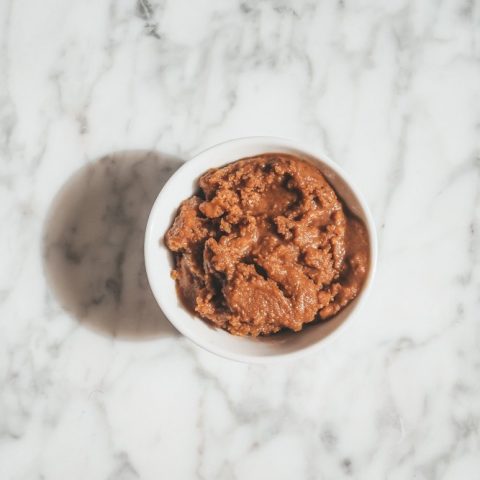
Kerisik
A South East Asian roasted coconut paste.
Ingredients
- 250 grams desiccated coconut
Instructions
- Over a medium high heat, toast the desiccated coconut in a pot until light brown, but not burnt. Allow the toasted desiccated coconut to cool slightly and using a hand blender or food processor, process the coconut into a runny paste. This step should not take more than 10 minutes.
Notes
This Kerala potato curry recipe is really quite simple, but in that simplicity any mistakes can let the dish down. With that, here are some notes and tips to help you achieve the best recipe outcome:
- Toast your whole spices: it may take an additional few minutes to do this and be mildly more inconvenient, but the smell of freshly toasted whole spices wafting through the house is intoxicating and adds to the experience. The process of toasting serves to release the oils in the spice seeds and bring the full flavour of the spices to bear.
- Use waxy potatoes or salad potatoes: there are broadly two kinds of potatoes – large starchy potatoes or small waxy potatoes (waxy refers to the texture and not actual wax). Starchy potatoes have a higher starch content compared to their smaller counterparts – they do not hold together as well, and they release their starch into the cooking liquid. This is not desirable in this preparation because by the time the potatoes have cooked and the cooking liquid has reduced, the potatoes will have pretty much disintegrated and you’ll be left with a soupy mess. The most suitable potatoes for a longer cook in liquid like this is a smaller potato like a salad potato or new potato. You could still use some starchy potatoes to add thickness to the sauce, but those bite-sized nuggets of potato should have some resistance.
- As always, give it a try, become confident and make it your own!: this vegan potato curry should be a mainstay of any kitchen, so once you’ve made it, you can tailor your own version. I love spiciness, so I may add a pinch of cayenne pepper or “spill” another teaspoon or two of chilli flakes. Curry leaves add a depth of herbaceous and floral notes, and fenugreek (methi) is another classic Indian flavour which is difficult to describe but is instantly recognisable. When making this spinach potato curry, I often throw in random vegetables from my fridge or freezer to add some variety, and often give a squeeze of lime. Ultimately, this recipe is something that should work for you, so make it do so!
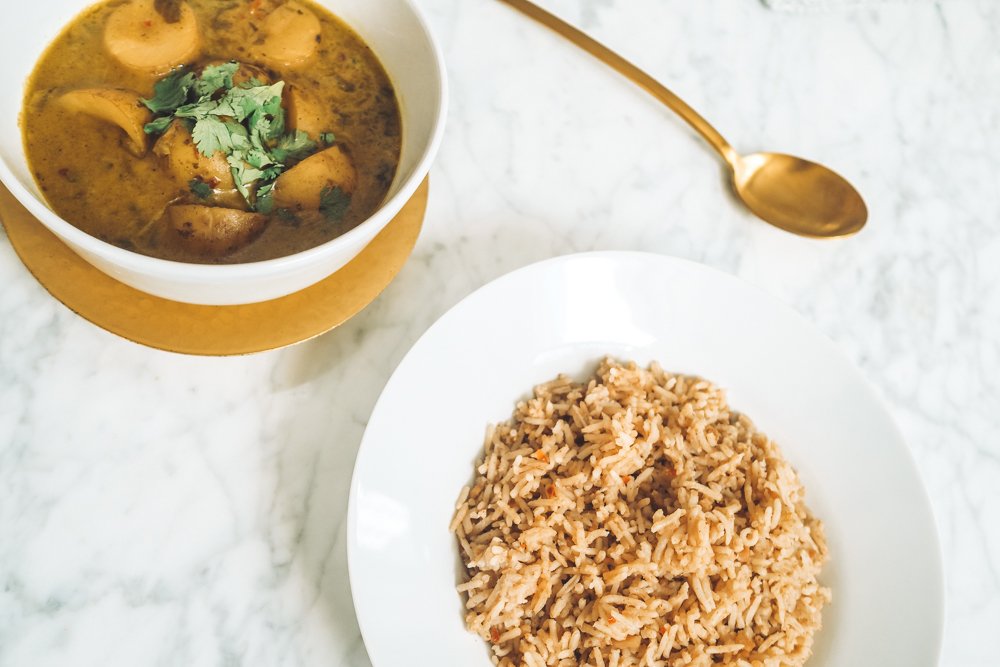
Serving Suggestions
As with most Asian dishes, rice would be a suitable base upon which to serve this saucy vegan potato curry. Whilst our garlic basmati rice is a firm favourite in our house, the real winner with this dish is our coconut lime rice. For one thing, the rice is creamy and delicious in its own right, and the coconut flavours really enhance each other, but there is also a practical reason. If you want to use kerisik as a thickener (recipe card posted above), it is used in both the coconut lime rice recipe and this spinach potato curry, and so really it is an added incentive to prepare this wonderful South East Asian roasted coconut paste.
The first time I made this dish at home, I also made my vegan mango salad with avocado and coriander, which adds a cooling balance to the fragrance, spice and richness of the curry.
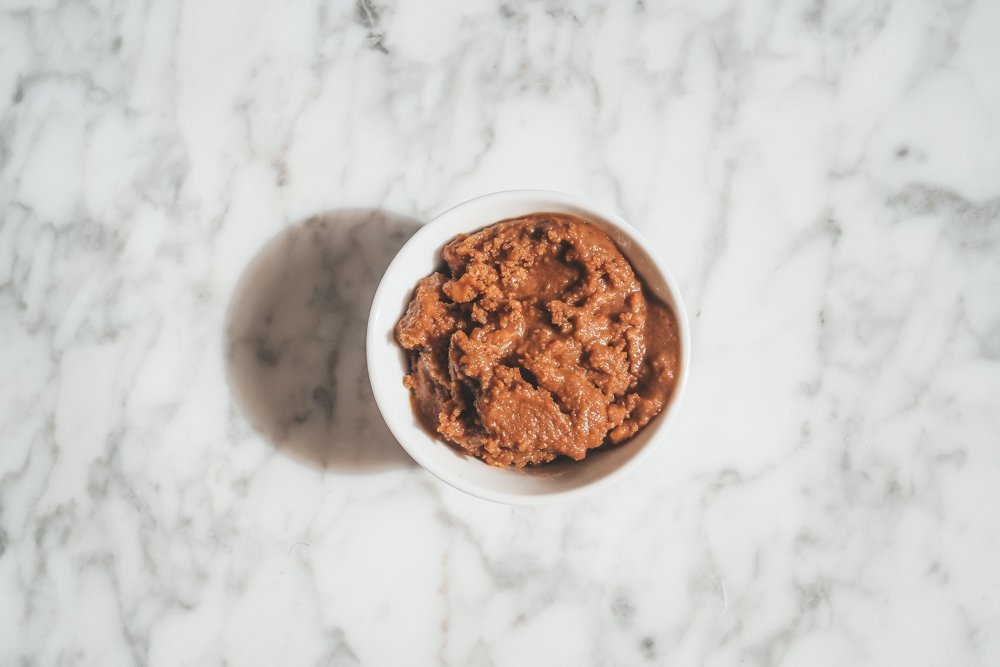
Reasons To Try Your Own Kerala Potato Curry
Kerala potato curry is tasty and filling (that is something that I look for in all food, so I almost take it for granted that it would be!), and impressively so for invited guests. That being said, these are the reasons that are important to me when preparing this Kerala style potato dish:
- It is easy to make – compared with many other curry recipes which require a number of steps, a large number of ingredients and a good amount of patience to learn and get right, this Kerala potato curry is simple and easy. For a start, it is pantry or freezer friendly in that most of the ingredients can be purchased ahead of time and can be called on in the last minute. The ingredients list (including spices) is relatively short, as is the cooking time.
- It is cost-effective – a relief for those used to cooking vegan and gluten-free is that this dish doesn’t break the bank. Once you’ve made your initial investment in your spices, your major expenses are coconut milk and potatoes. All in all, you can pull together 8-10 servings of the curry for far less than $1/£1/€1 per serving.
- It is versatile – what I really love about this recipe is that, once cooked it can be used in a number of different preparations. Whilst you can always enjoy this Kerala potato curry as a saucy accompaniment to rice (check out our decadent coconut lime rice which works really well with this!), you can easily add in some more coconut milk and enjoy as a creamy, spicy soup. Another really enjoyable preparation (and works really well for leftovers if you have any) is to mix with partially-cooked rice and bake in the oven to give a wonderful South Indian potato curry “biriyani” style dish. I’ve not yet tried this, but I fully intend to make some mini gluten-free Kerala potato curry pies with the next batch of leftovers (using my new favourite gluten free puff pastry – watch this space!).
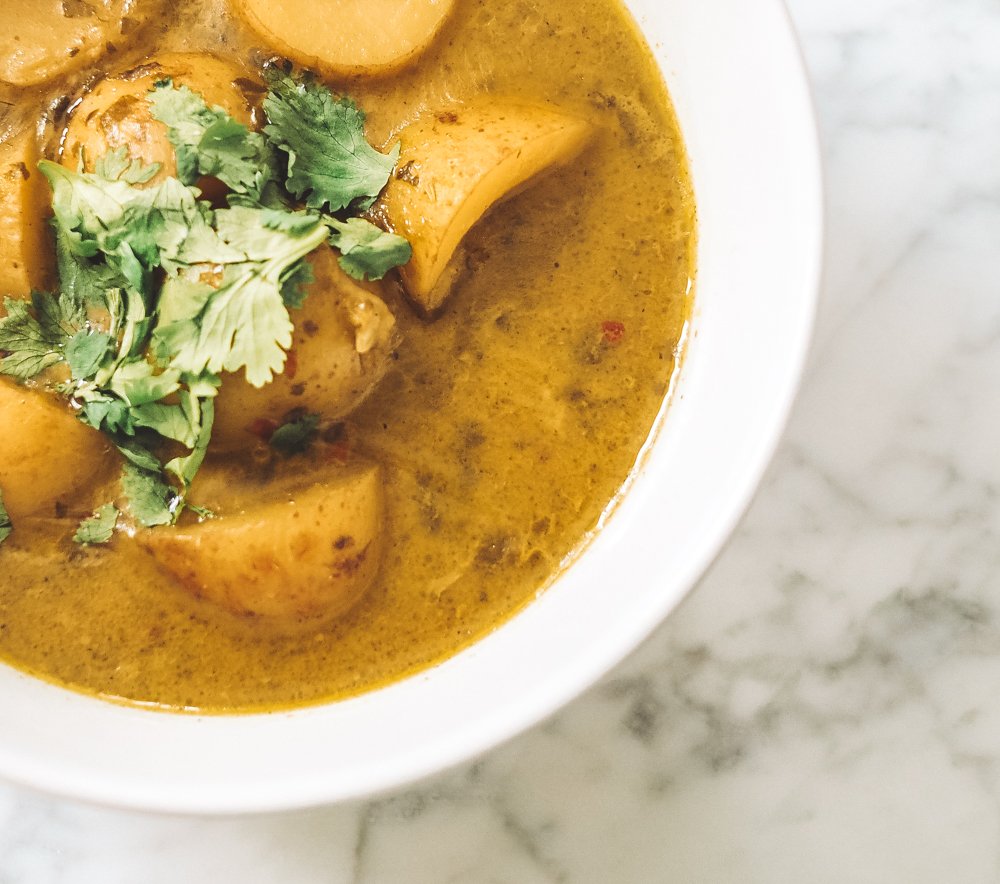
We hope you enjoy reading this recipe and decide to try to make your own Kerala potato curry at home. If you like it, please drop a comment and let us know what you think.
Check out Dukes Kitchen for more vegan recipes!
Don’t forget to pin this article if you found it helpful, and follow Dukes Avenue on Pinterest for more!
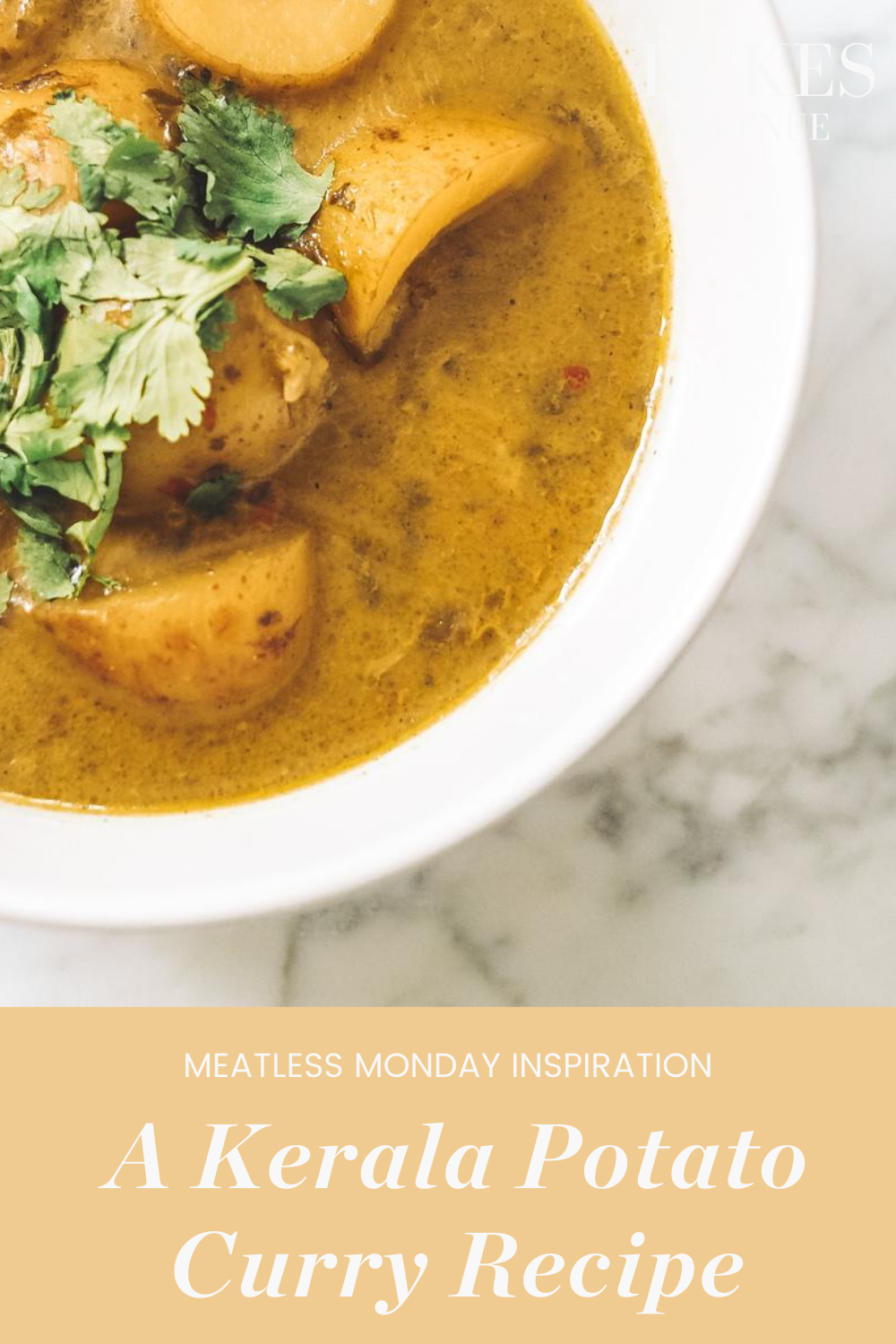
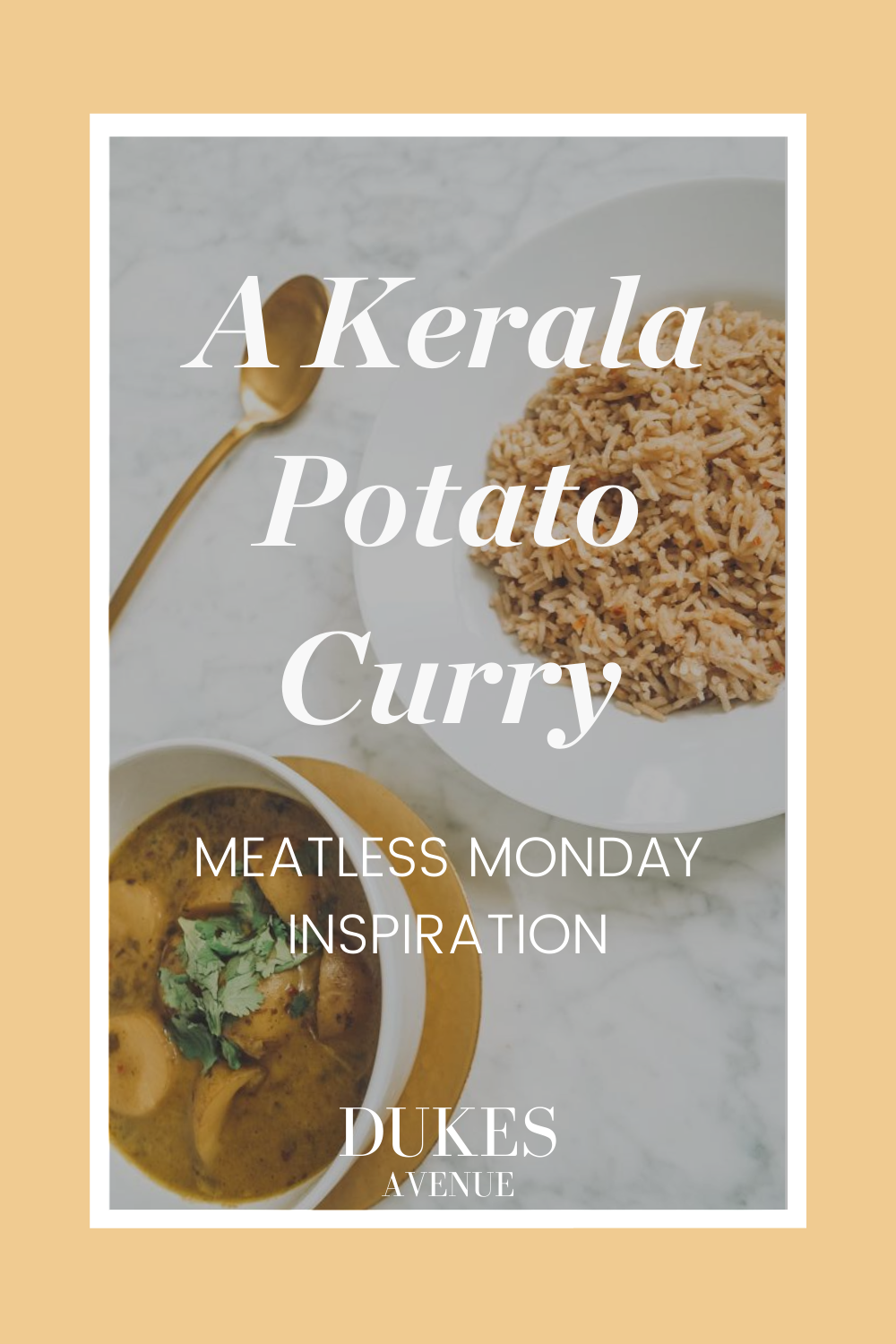
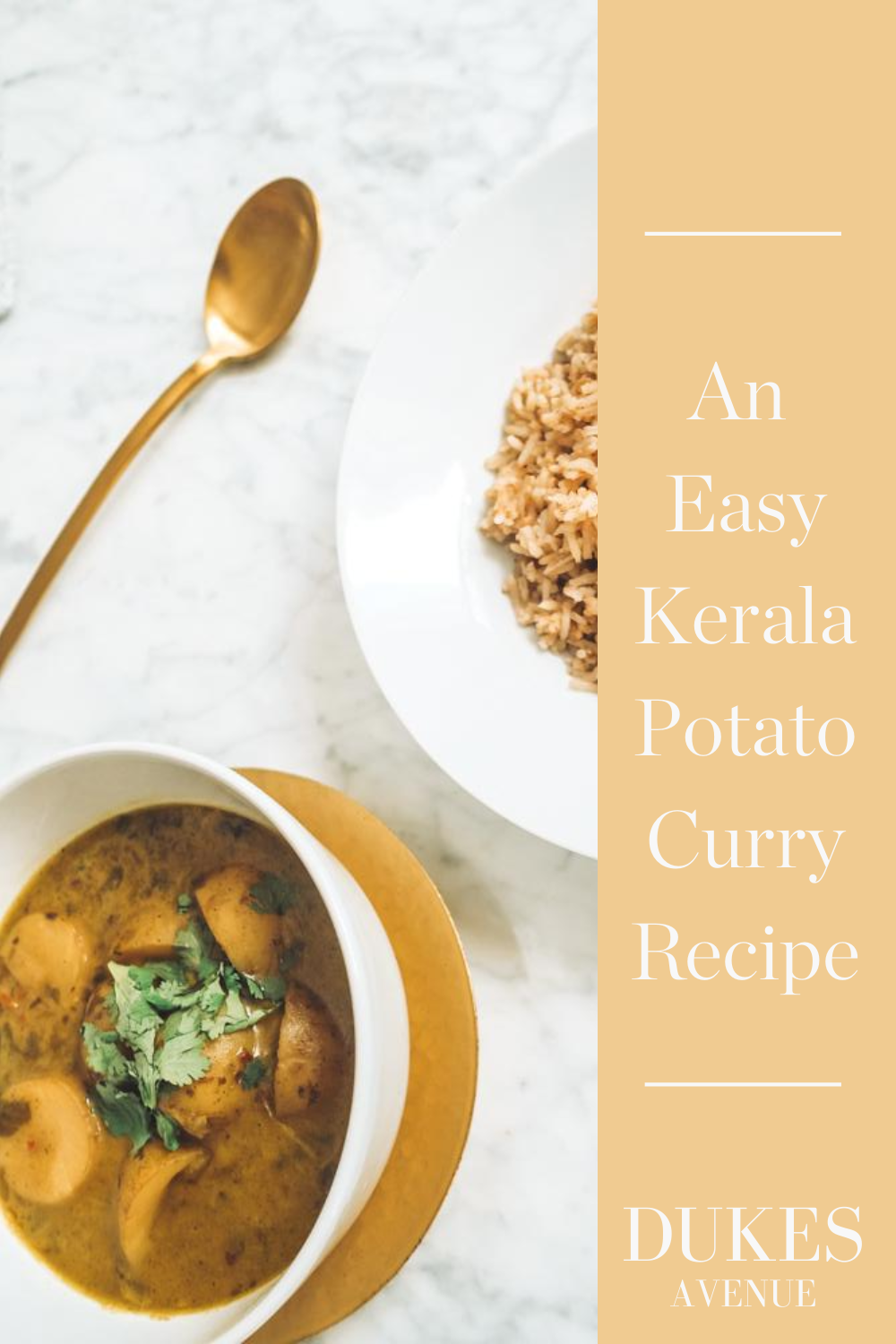

Sarah is a syndicated freelance writer and editor of Dukes Avenue. She founded Dukes Avenue in 2018 as a creative outlet while working at a London hedge fund. What initially started as a small blog has become a widely read luxury lifestyle online publication targeted at the modern woman, with content curated to inspire readers to live their best and most fulfilled lives. Sarah has lived in London, Malta, and, most recently, the United Arab Emirates and uses her travels and experiences to inspire much of the content.
-
Sarah Borg Barthethttps://dukesavenue.com/author/sarah-borg-barthet/
-
Sarah Borg Barthethttps://dukesavenue.com/author/sarah-borg-barthet/
-
Sarah Borg Barthethttps://dukesavenue.com/author/sarah-borg-barthet/
-
Sarah Borg Barthethttps://dukesavenue.com/author/sarah-borg-barthet/






